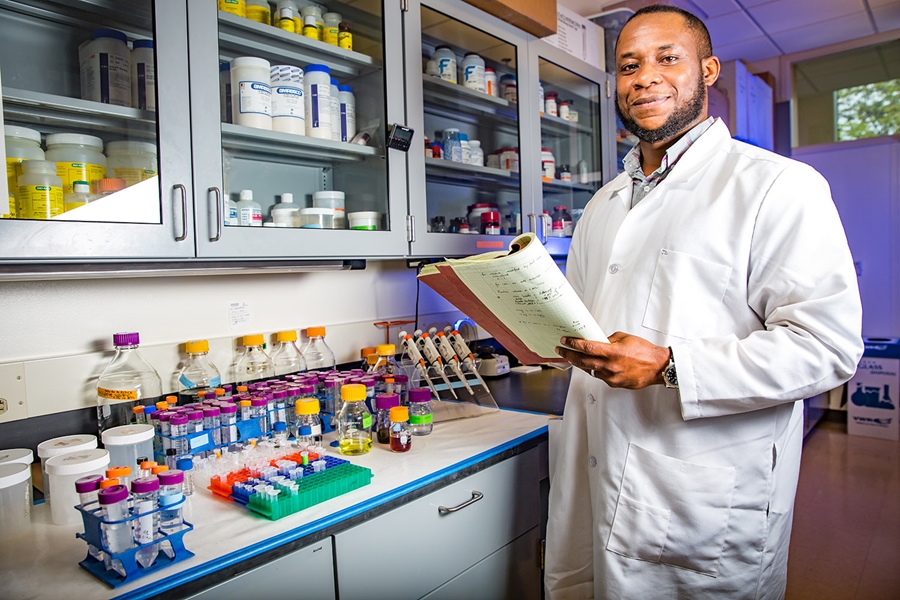Graduate Student Looks to Make Smart Textiles, Exotic Surfaces a Reality

Joseph Batta-Mpouma spends lots of time in his lab working to fabricate smart textiles and exotic surfaces
Imagine the Razorback soccer team's jerseys were made of fabric capable of continuously monitoring and communicating athletes' breathing rates, heart rates and temperatures to the coaching and training staff on the sidelines. This could potentially improve the staff's ability to make coaching decisions and provide a better point of care for the athletes.
What if the same material were used for a baby's mattress, allowing parents to monitor their newborn while he sleeps? Or, what if smart phones were outfitted with antireflective, self-cleaning screens?
Joseph Batta-Mpouma, a microelectronics-photonics doctoral student and member of the bionanotechnology research group at the Institute for Nanoscience and Engineering, is working to turn this idea of smart textiles and exotic surfaces from mere fantasy to reality.
Batta-Mpouma, a native of Cameroon, is in the midst of developing a process to fabricate cellulose nanocrystals-based nanofibers and films from cellulose-rich plant materials. The nanofibers would have many potential applications in biosensing, photovoltaics and displays, including the creation of wearable bioelectronics textiles.
One of the reasons Batta-Mpouma is focusing on cellulose nanocrystals, a subunit of cellulose, is because of the potential cost implications for consumers.
"Cellulose is one of the most abundant sources of natural materials we have in nature," he said. "Because of its abundance, it is relatively cheap. So, we can make the same materials others are making with petroleum-based products, except ours will be more cost affordable and eco-friendly."
According to Batta-Mpouma, wearable bioelectronics are still years away from being a reality. However, he is pleased with the progress he has been making in the lab.
"We are developing the process of creating the cellulose materials needed, but the procedure for making fibers out of those materials is still in its infancy," he said.
Batta-Mpouma said his research has come with multiple challenges, but he finds motivation in every step of the process.
"Each step of research is always challenging," he said. "If it's not challenging, then it's not research. But, if you keep your end goal in mind, you'll find there is always a way to overcome the hurdle."
Batta-Mpouma, who is advised by biological engineering professor Jin-Woo Kim, holds bachelor's degrees in physics and engineering from Southern Arkansas University and a master's degree in microelectronics-photonics from the University of Arkansas. He hopes to complete his doctoral degree in 2018.
Topics
Contacts
Amanda Cantu, director of communications
Graduate School and International Education
479-575-5809,
amandcan@uark.edu
Headlines
PetSmart CEO J.K. Symancyk to Speak at Walton College Commencement
J.K. Symancyk is an alumnus of the Sam M. Walton College of Business and serves on the Dean’s Executive Advisory Board.
Faulkner Center, Arkansas PBS Partner to Screen Documentary 'Gospel'
The Faulkner Performing Arts Center will host a screening of Gospel, a documentary exploring the origin of Black spirituality through sermon and song, in partnership with Arkansas PBS at 7:30 p.m. Thursday, May 2.
UAPD Officers Mills and Edwards Honored With New Roles
Veterans of the U of A Police Department, Matt Mills has been promoted to assistant chief, and Crandall Edwards has been promoted to administrative captain.
Community Design Center's Greenway Urbanism Project Wins LIV Hospitality Design Award
"Greenway Urbanism" is one of six urban strategies proposed under the Framework Plan for Cherokee Village, a project that received funding through an Our Town grant from the National Endowment for the Arts.
Spring Bike Drive Refurbishes Old Bikes for New Students
All donated bikes will be given to Pedal It Forward, a local nonprofit that will refurbish your bike and return it to the U of A campus to be gifted to a student in need. Hundreds of students have already benefited.




